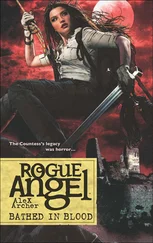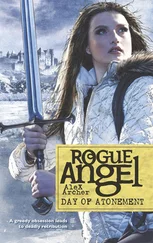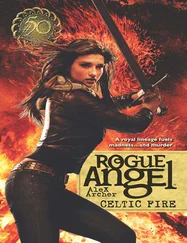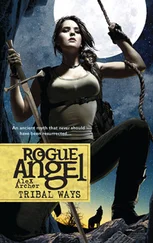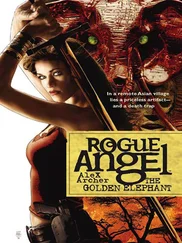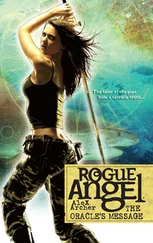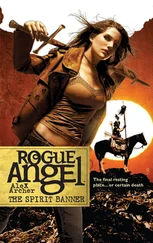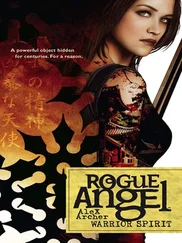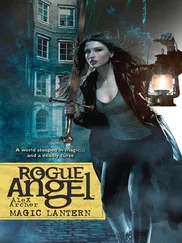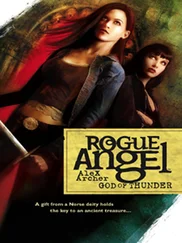Annja tried to read between the lines. “Are you suggesting Torquemada might have not been as bad as he’s currently portrayed?”
“Quite the reverse, actually—that he was perhaps not as pious and devout as he is now remembered to be. For a man who was a scourge on nonbelievers and heretics, isn’t it peculiar that he carried what he believed to be the horn of a unicorn for protection?”
“No more crazy than the zealots who think they’re carrying a piece of the True Cross,” she said.
“Ah, perhaps not, but does a man wielding supernatural protections—the objects of witchcraft—strike you as someone who believes absolutely in the protection of his God?” The curator came to a halt. “His tomb was broken into in the 1830s, his bones removed and burned here, on this spot, mimicking an auto-da-fé, the kind of act of faith Torquemada would have ordered during his lifetime. It was something in the nature of poetic justice. The Inquisition had fallen out of favor and the people were no longer afraid of the Church in the way they had been for hundreds of years. So much of the monastery was destroyed thanks to those revolutionary hammers. Which is of course how we lost that wonderful Mudéjar ceiling.”
“And that was when the mask was removed?” Or more likely destroyed, she thought.
“There is no record of anything other than his remains having been removed from the tomb, but that was not the first time his rest had been disturbed.”
“The tomb had been broken into before?”
“Indeed, yes. Only a couple of years after his death, in fact. Records indicate that a ring was taken from the remains. It was recovered and returned to the corpse. The thief was given the same treatment as many of Torquemada’s own victims. Of course, that doesn’t mean something else wasn’t taken and never returned.”
Annja was already running the permutations in her head. If the mask had remained in the tomb until the 1830s, then it had almost certainly been destroyed in the desecration or fallen into the possession of some rich private collector with a penchant for the macabre. The latter possibility would only make the treasure hunt more difficult. Theft a few years after the dead man’s burial was preferable, since it meant there was much more time for the mask to have become lost and ultimately forgotten. But its chances of survival increased markedly if it had been stolen in the nineteenth century. The question was, where was it most likely to have gone next?
“There is a plaque,” the curator said. “Let me show you.”
The man led her through to what remained of Torquemada’s tomb. It was little more than a symbolic plaque.
“‘Here Lies the Reverend Tomás de Torquemada, One of the Holy Cross, the Inquisitor General. This House’s Founder. Died 1518, on 16 September,’” Annja translated from the Latin inscription.
“Very impressive,” said the curator. “It’s rare to find a—” he checked himself before saying woman “—person these days with a fair grasp of Latin.”
“I’m all about the dead languages.” She laughed, spotting another inscription on the wall. “They look great on the dating profiles.” That confused the poor guy for a moment, reminding her that they were communicating in what was obviously his second or even third language.
She mouthed the next words without actually making a sound. May This Plague of Heretics Pass .
“I don’t think he really wanted to be buried here. It was more of a political decision than anything else,” Maffrici said. “He was born in Valladolid and never really severed ties with the city. He established a tribunal for the Inquisition there and remained connected to the Convent of San Francisco until his dying day. The strange thing is...” He broke off suddenly, as if not sure he should be speculating so freely in front of her. Annja waited patiently while he considered whatever it was he was about to say—or not say.
“What is it?” she asked eventually, breaking into his private world.
“There’s a novel,” he said. “ El hereje. The Heretic by Miguel Delibes, one of our most celebrated novelists. Perhaps you’ve heard of it? The inscription there reminds me of it. The book is set in Valladolid and describes something called the path of the heretic, or the pass. But that is not what I just realized...what...stopped me. I haven’t really thought about this before, but it has been staring me in the face for such a very long time.” He rubbed his white-gloved hands together as though in appreciation or greed. “The ceiling, the one that’s missing from the dome...that depicted Valladolid, too.”
“So what you’re saying is, in terms of Torquemada at least, all roads lead to Valladolid,” she said, grinning. It was too much for this all to be coincidence. Of course, there was no guarantee that the mask had been taken there, but there was a strong connection between this place, the Grand Inquisitor and the city of Valladolid. She checked her watch. She could make the ride in an hour, ignoring speed limits, but first she had to meet Roux’s hacker.
4
22:30 —Ávila
Annja had to ask for directions to Giorgio’s. It wasn’t on the main drag, but rather tucked away on a quaint side street that, as she walked down it, gave her the distinct impression of time travel. Each step seemed to take her back a decade until she was somewhere around the fifteenth or sixteenth century, surrounded by amazing buildings that had withstood the Inquisition and the civil war and the ravages of change. Giorgio’s was one of those hip spots where the beautiful people went and made sure that everyone else knew just how hip it was.
Annja checked her reflection in the Roadster’s side mirror, the bike helmet in her hand, long hair spilling over bike leathers. She grinned. She certainly didn’t resemble some young, upwardly mobile stockbroker, or a woman in search of one.
She opened the door, and even before she’d taken her first step inside, she received a mixture of looks from the clientele that could have frozen a penguin on an ice floe. The women scowled in disapproval, sneering at the skintight leathers, while the men leaned forward, interested, engaged. She ignored both. She was used to being stared at. It was part of being a celebrity. Even if she wasn’t a big star, there was always someone on the street who would do a double take, obviously thinking, Aren’t you the woman from the TV show?
She scanned the room. There were at least a dozen guys sitting alone in different parts of the café. A few had shot a glance—or more than a glance—in her direction, but none of them had raised a hand in recognition. She didn’t hold any of their gazes, and it didn’t take long for most of them to look away, drawn back to their computer screens and cell phones. As she walked toward the counter at the far side of the café, she noticed that one man was still watching her. There was a paperback copy of Howard Fast’s Torquemada next to his untouched cappuccino. That was enough to convince Annja he was her guy.
She walked to his table and sat down.
“Annja,” the young man said. He didn’t rise to shake her hand. And unlike the rest of the men in the vicinity, he didn’t appear to be mentally stripping her leathers. “You made good time. I’m Oscar.”
She sat down across from him. He was barely old enough to be out of university, but when it came to tech wizardry it was a case of “the younger, the better” these days. His tousled, sun-bleached hair was stylishly unkempt. He fit in here far more than she did. His olive skin was offset against a white cotton shirt. Not that she was one to judge a book by its cover, but this kid was the polar opposite of every computer nerd she’d ever met. She didn’t know what to make of that, but Roux trusted him with Garin’s life. She knew that much.
Читать дальше

